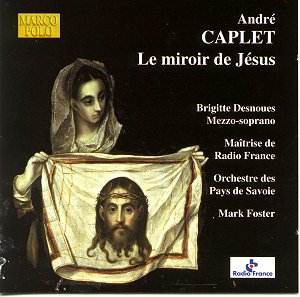ANDRÉ CAPLET (1878-1925) Le Miroir de
Jésus (1923)
 Brigitte Desnoues (mezzo)
Maîtrise de Radio France Orchestre des Pays de Savoie/Mark Foster
Brigitte Desnoues (mezzo)
Maîtrise de Radio France Orchestre des Pays de Savoie/Mark Foster
 rec Radio France, Paris, 23-25
Nov 1996 MARCO POLO 8.225043 [61.13]
rec Radio France, Paris, 23-25
Nov 1996 MARCO POLO 8.225043 [61.13]

Caplet died early of pleurisy perhaps exacerbated by having been gassed in
1916 during the Great War. He is known as an acolyte of Debussy and Ravel
and helped the former orchestrate Le Martyre de Saint Sebastien.
Caplet's triptych oratorio is the very antithesis of the British cathedral
tradition. It contents itself with harp and strings rather than a bloated
orchestra. The choir sings with light and delicacy. Ravel's Ma Mère
l'Oie and the Trois Poèmes de Charles d'Orléans would
be an approximation of Caplet's language but to strike a closer balance other
echoes (and predictions) need to come in. The string orchestra has about
it the gossamer of Tippett's Concerto for Double String Orchestra.
The vocal line, both in solo and choir, touches Finzi, Howells and Britten's
Hymn to St Cecilia. It is however much more varied than these references
might suggest. The score also takes in chant, declamation and sprechgesang
(track 18 - 03.10); the latter as emotionally devastating as the tenor's
spoken words in Warlock's The Curlew.
The three parts of the Triptych are: Miroir de Joie, Miroir de
Peine, Miroir de Gloire. Each panel is launched by a substantial
prélude and succeeded by seven sung poems. The devotional poems tracing
the life of Christ are by Henri Ghéon. The settings capture a silky
ecstasy comparable with the Fauré Requiem though more buoyant
and flexible. There is a lively and varied beauty in the writing which can
remind you of Finzi's Dies Natalis and Vaughan Williams' Flos
Campi. Bells seem to peal in a round-dance of joy in the Prélude
to the final panel and in its Couronnnement au ciel.
The recording is sensitively contrived and all the performers engage at every
level with the music which is nothing short of a twentieth century masterwork
unaccountably overlooked until now. Desnoues and the Radio France choir are
superb in the conveyed sense of wonder and beauty. I do not exaggerate. Do
try this gloriously turned and sensuously devotional revel in the senses.
Reviewer
Rob Barnett

NOTE - I have recently reviewed
an Harmonia Mundi disc of Caplet's
Quintet for piano and winds
